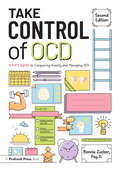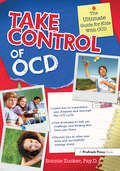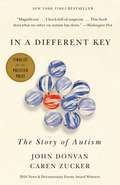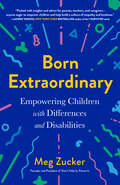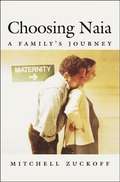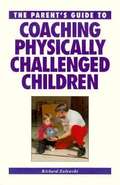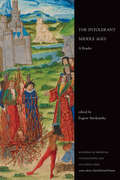- Table View
- List View
Take Control of OCD: A Kid's Guide to Conquering Anxiety and Managing OCD
by Bonnie ZuckerTake Control of OCD: A Kid's Guide to Conquering Anxiety and Managing OCD is a must-have guide for kids and teens ages 10-16 with Obsessive-Compulsive Disorder to help them take control and use their strengths to find success in school and in life. This fully updated second edition:Uses a cognitive-behavioral therapy and exposure/response prevention method to stress gradual exposure to obsessive thinking patterns.Provides a step-by-step ladder-based process to help readers conquer their fears and demolish their worries.Helps kids change their obsessive thoughts, tolerate uncertainty, and develop positive self-talk and stress management.Also helps kids advocate for their needs in school and build successful relaxation procedures.Includes workbook-style pages for readers to complete.By interviewing kids with OCD from across the country, the author offers tons of advice, information, and ideas for students, by students just like them. Readers will find themselves in this book, as it normalizes and validates the often hidden and undisclosed thoughts, urges, and images, and accompanying rituals and compulsions that so many children and teens with OCD struggle with.Ages 10-16
Take Control of OCD: The Ultimate Guide for Kids With OCD (Take Control Ser. #0)
by Bonnie ZuckerTake Control of OCD: The Ultimate Guide for Kids With OCD is a unique guide just for kids ages 10-16 with Obsessive-Compulsive Disorder to help them take control of their disorder and find success in school and in life. Using a cognitive-behavioral therapy method to stress gradual exposure to students' obsessive thinking patterns, the book takes kids step-by-step through a ladder-based process to conquer their fears and demolish their worries.Focusing on helping kids change their obsessive thoughts, tolerate uncertainty, develop positive self-talk and stress management, advocate for their needs in school, find successful relaxation procedures, and face their fears, the book includes workbook-style pages for kids to complete. By interviewing kids with OCD from across the country, the author offers tons of advice, information, and ideas for students, by students just like them. This handy guidebook is sure to help children with OCD change their behaviors and conquer their worries, discovering a sense of accomplishment and achievement.Ages 10-16
In a Different Key
by Caren Zucker John DonvanNearly seventy-five years ago, Donald Triplett of Forest, Mississippi became the first child diagnosed with autism. Beginning with his family's odyssey, In a Different Key tells the extraordinary story of this often misunderstood condition, and of the civil rights battles waged by the families of those who have it. Unfolding over decades, it is a beautifully rendered history of ordinary people determined to secure a place in the world for those with autism--by liberating children from dank institutions, campaigning for their right to go to school, challenging expert opinion on what it means to have autism, and persuading society to accept those who are different. It is the story of women like Ruth Sullivan, who rebelled against a medical establishment that blamed cold and rejecting "refrigerator mothers" for causing autism; and of fathers who pushed scientists to dig harder for treatments. Many others played starring roles too: doctors like Leo Kanner, who pioneered our understanding of autism; lawyers like Tom Gilhool, who took the families' battle for education to the courtroom; scientists who sparred over how to treat autism; and those with autism, like Temple Grandin, Alex Plank, and Ari Ne'eman, who explained their inner worlds and championed the philosophy of neurodiversity. This is also a story of fierce controversies--from the question of whether there is truly an autism "epidemic," and whether vaccines played a part in it; to scandals involving "facilitated communication," one of many treatments that have proved to be blind alleys; to stark disagreements about whether scientists should pursue a cure for autism. There are dark turns too: we learn about experimenters feeding LSD to children with autism, or shocking them with electricity to change their behavior; and the authors reveal compelling evidence that Hans Asperger, discoverer of the syndrome named after him, participated in the Nazi program that consigned disabled children to death.By turns intimate and panoramic, In a Different Key takes us on a journey from an era when families were shamed and children were condemned to institutions to one in which a cadre of people with autism push not simply for inclusion, but for a new understanding of autism: as difference rather than disability.
In a Different Key: The Story of Autism
by Caren Zucker John DonvanAn extraordinary narrative history of autism: the riveting story of parents fighting for their children 's civil rights; of doctors struggling to define autism; of ingenuity, self-advocacy, and profound social changeNearly seventy-five years ago, Donald Triplett of Forest, Mississippi, became the first child diagnosed with autism. Beginning with his family's odyssey, In a Different Key tells the extraordinary story of this often misunderstood condition, and of the civil rights battles waged by the families of those who have it. Unfolding over decades, it is a beautifully rendered history of ordinary people determined to secure a place in the world for those with autism--by liberating children from dank institutions, campaigning for their right to go to school, challenging expert opinion on what it means to have autism, and persuading society to accept those who are different. It is the story of women like Ruth Sullivan, who rebelled against a medical establishment that blamed cold and rejecting "refrigerator mothers" for causing autism; and of fathers who pushed scientists to dig harder for treatments. Many others played starring roles too: doctors like Leo Kanner, who pioneered our understanding of autism; lawyers like Tom Gilhool, who took the families' battle for education to the courtroom; scientists who sparred over how to treat autism; and those with autism, like Temple Grandin, Alex Plank, and Ari Ne'eman, who explained their inner worlds and championed the philosophy of neurodiversity. This is also a story of fierce controversies--from the question of whether there is truly an autism "epidemic," and whether vaccines played a part in it; to scandals involving "facilitated communication," one of many treatments that have proved to be blind alleys; to stark disagreements about whether scientists should pursue a cure for autism. There are dark turns too: we learn about experimenters feeding LSD to children with autism, or shocking them with electricity to change their behavior; and the authors reveal compelling evidence that Hans Asperger, discoverer of the syndrome named after him, participated in the Nazi program that consigned disabled children to death.By turns intimate and panoramic, In a Different Key takes us on a journey from an era when families were shamed and children were condemned to institutions to one in which a cadre of people with autism push not simply for inclusion, but for a new understanding of autism: as difference rather than disability.From the Hardcover edition.
In a Different Key: The Story of Autism
by Caren Zucker John DonvanAn extraordinary narrative history of autism: the riveting story of parents fighting for their children ’s civil rights; of doctors struggling to define autism; of ingenuity, self-advocacy, and profound social changeNearly seventy-five years ago, Donald Triplett of Forest, Mississippi, became the first child diagnosed with autism. Beginning with his family’s odyssey, In a Different Key tells the extraordinary story of this often misunderstood condition, and of the civil rights battles waged by the families of those who have it. Unfolding over decades, it is a beautifully rendered history of ordinary people determined to secure a place in the world for those with autism—by liberating children from dank institutions, campaigning for their right to go to school, challenging expert opinion on what it means to have autism, and persuading society to accept those who are different. It is the story of women like Ruth Sullivan, who rebelled against a medical establishment that blamed cold and rejecting “refrigerator mothers” for causing autism; and of fathers who pushed scientists to dig harder for treatments. Many others played starring roles too: doctors like Leo Kanner, who pioneered our understanding of autism; lawyers like Tom Gilhool, who took the families’ battle for education to the courtroom; scientists who sparred over how to treat autism; and those with autism, like Temple Grandin, Alex Plank, and Ari Ne’eman, who explained their inner worlds and championed the philosophy of neurodiversity. This is also a story of fierce controversies—from the question of whether there is truly an autism “epidemic,” and whether vaccines played a part in it; to scandals involving “facilitated communication,” one of many treatments that have proved to be blind alleys; to stark disagreements about whether scientists should pursue a cure for autism. There are dark turns too: we learn about experimenters feeding LSD to children with autism, or shocking them with electricity to change their behavior; and the authors reveal compelling evidence that Hans Asperger, discoverer of the syndrome named after him, participated in the Nazi program that consigned disabled children to death.By turns intimate and panoramic, In a Different Key takes us on a journey from an era when families were shamed and children were condemned to institutions to one in which a cadre of people with autism push not simply for inclusion, but for a new understanding of autism: as difference rather than disability.— Washington Post, Notable Non-fiction Books in 2016— WBUR, Best Books of 2016— Wall Street Journal, Best Books of the Year
In a Different Key: The Story of Autism
by Caren Zucker John DonvanAn extraordinary narrative history of autism: the riveting story of parents fighting for their children ’s civil rights; of doctors struggling to define autism; of ingenuity, self-advocacy, and profound social changeNearly seventy-five years ago, Donald Triplett of Forest, Mississippi, became the first child diagnosed with autism. Beginning with his family’s odyssey, In a Different Key tells the extraordinary story of this often misunderstood condition, and of the civil rights battles waged by the families of those who have it. Unfolding over decades, it is a beautifully rendered history of ordinary people determined to secure a place in the world for those with autism—by liberating children from dank institutions, campaigning for their right to go to school, challenging expert opinion on what it means to have autism, and persuading society to accept those who are different. It is the story of women like Ruth Sullivan, who rebelled against a medical establishment that blamed cold and rejecting “refrigerator mothers” for causing autism; and of fathers who pushed scientists to dig harder for treatments. Many others played starring roles too: doctors like Leo Kanner, who pioneered our understanding of autism; lawyers like Tom Gilhool, who took the families’ battle for education to the courtroom; scientists who sparred over how to treat autism; and those with autism, like Temple Grandin, Alex Plank, and Ari Ne’eman, who explained their inner worlds and championed the philosophy of neurodiversity. This is also a story of fierce controversies—from the question of whether there is truly an autism “epidemic,” and whether vaccines played a part in it; to scandals involving “facilitated communication,” one of many treatments that have proved to be blind alleys; to stark disagreements about whether scientists should pursue a cure for autism. There are dark turns too: we learn about experimenters feeding LSD to children with autism, or shocking them with electricity to change their behavior; and the authors reveal compelling evidence that Hans Asperger, discoverer of the syndrome named after him, participated in the Nazi program that consigned disabled children to death.By turns intimate and panoramic, In a Different Key takes us on a journey from an era when families were shamed and children were condemned to institutions to one in which a cadre of people with autism push not simply for inclusion, but for a new understanding of autism: as difference rather than disability.
In a Different Key: The Story of Autism
by Caren Zucker John DonvanAn extraordinary narrative history of autism: the riveting story of parents fighting for their children ’s civil rights; of doctors struggling to define autism; of ingenuity, self-advocacy, and profound social changeNearly seventy-five years ago, Donald Triplett of Forest, Mississippi, became the first child diagnosed with autism. Beginning with his family’s odyssey, In a Different Key tells the extraordinary story of this often misunderstood condition, and of the civil rights battles waged by the families of those who have it. Unfolding over decades, it is a beautifully rendered history of ordinary people determined to secure a place in the world for those with autism—by liberating children from dank institutions, campaigning for their right to go to school, challenging expert opinion on what it means to have autism, and persuading society to accept those who are different. It is the story of women like Ruth Sullivan, who rebelled against a medical establishment that blamed cold and rejecting “refrigerator mothers” for causing autism; and of fathers who pushed scientists to dig harder for treatments. Many others played starring roles too: doctors like Leo Kanner, who pioneered our understanding of autism; lawyers like Tom Gilhool, who took the families’ battle for education to the courtroom; scientists who sparred over how to treat autism; and those with autism, like Temple Grandin, Alex Plank, and Ari Ne’eman, who explained their inner worlds and championed the philosophy of neurodiversity. This is also a story of fierce controversies—from the question of whether there is truly an autism “epidemic,” and whether vaccines played a part in it; to scandals involving “facilitated communication,” one of many treatments that have proved to be blind alleys; to stark disagreements about whether scientists should pursue a cure for autism. There are dark turns too: we learn about experimenters feeding LSD to children with autism, or shocking them with electricity to change their behavior; and the authors reveal compelling evidence that Hans Asperger, discoverer of the syndrome named after him, participated in the Nazi program that consigned disabled children to death.By turns intimate and panoramic, In a Different Key takes us on a journey from an era when families were shamed and children were condemned to institutions to one in which a cadre of people with autism push not simply for inclusion, but for a new understanding of autism: as difference rather than disability.
Born Extraordinary: Empowering Children with Differences and Disabilities
by Meg ZuckerA parent&’s guide to empowering children to embrace their visible and invisible differences Meg Zucker was born with one finger on each hand, shortened forearms, and one toe on each misshapen foot, caused by a genetic condition called ectrodactyly. She would eventually pass this condition on to her two sons, and, along with her husband, raise them and their adopted daughter, who has her own invisible differences. Born of the family&’s hard-won experiences, this book offers invaluable advice on raising confident, empathetic, and resilient children who succeed, not despite but because of their differences. Born Extraordinary helps parents of children with differences and disabilities to relinquish their instinctive anxieties, embrace their new normal, and ultimately find joy in watching their children thrive. Often the subjects of unwanted attention—ranging from pitying stares to bullying—Zucker and her sons have learned to ignore what others think and live fearlessly. Also incorporating the stories of other families with visible and invisible differences of all kinds, Born Extraordinary gives parents the tools to meet their children&’s emotional needs while supporting the whole family unit. Parents learn how best to empower their children to confront others&’ assumptions, grow in confidence, and encourage dialogue—rather than silence, fear, and shame—around difference.
Choosing Naia: A Family's Journey
by Mitchell ZuckoffChoosing Naia is a powerful story, based on an award-winning series of articles about a modern family and their Down syndrome baby. A dramatic and carefully detailed account of one family's journey through the maze of genetic counseling, medical technology, and disability rights
The Parents Guide to Coaching Physically Challenged Children
by Richard ZulewskiHandbooks in The Better Way Coaching Kids series serve as the perfect step-by-step introductory primers for parents and coaches. Written in an easy, conversational style, these books cover all the basic skill-building techniques, rules of the games, proper equipment and first aid. These guides focus on team spirit, the importance of fair play and overall fun. Special attention is paid to developing a child's confidence and self-esteem, -- all important keys to success.
The Intolerant Middle Ages: A Reader (Readings in Medieval Civilizations and Cultures)
The Intolerant Middle Ages is a collection of primary sources on the history of persecution. The goal of the book is to highlight instances of persecution and violence, as well as those relatively rare but significant episodes of toleration, toward an intentionally broad spectrum of people who existed at the margins of medieval society: heretics, Jews and Muslims, the poor, the displaced and disabled, women, and those deemed sexually deviant. The volume also presents a more geographically diverse Middle Ages by including sources from Central and Eastern Europe as well as the Mediterranean. Sources are organized in thematic chapters, covering everything from "Heresy and Inquisition" to "Disease and Disability." Each document is preceded by a brief introduction and followed by questions for discussion, making The Intolerant Middle Ages an excellent entrance into the lives and struggles of minorities in the medieval world.
